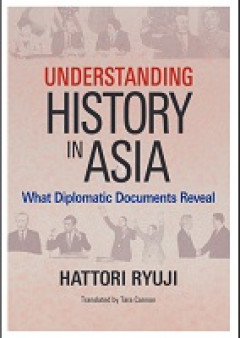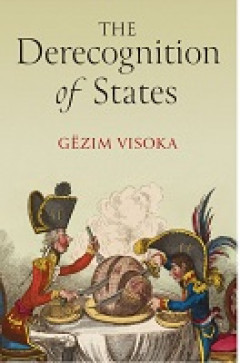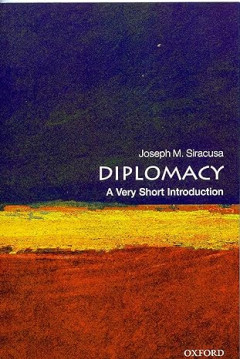Ditapis dengan
E-book Compound Containment : A Reigning Power's Military-Economic Countermea…
When is a reigning great power of the international system in a position to complement military containment of a challenging power with restrictive economic measures? It has been long argued that a reigning power is inclined to militarily confront a challenging power that has the potential to undermine international stability and threaten the reigning state’s privi-leged r…
- Edisi
- -
- ISBN/ISSN
- 9780472902804
- Deskripsi Fisik
- 213 hlm
- Judul Seri
- -
- No. Panggil
- 327.2 KIM c

E-book Understanding History in Asia: What Diplomatic Documents Reveal
The twentieth century has been called a century of war. Wars and colonization leave deep chasms between countries. In the case of Japan, these frictions have manifested themselves as historical issues. The history since World War II has also been a history of tyring to overcome the hostility surrounding these issues. Since the end of the war there have been various attempts at reconciliation, a…
- Edisi
- -
- ISBN/ISSN
- 9784866580548
- Deskripsi Fisik
- 270 halaman, ilus.
- Judul Seri
- -
- No. Panggil
- 327.2 HAT u

E-book The Derecognition of States
Although a great deal is known about the recognition of states, less is known about the practice of derecognition of states, namely why and how states withdraw the recognition of other contested and partially recognized states. The Derecognition of States offers a global and comparative outlook of this unexplored diplomatic practice. Using original empirical research, it addresses the complex p…
- Edisi
- -
- ISBN/ISSN
- 9780472077090
- Deskripsi Fisik
- 299 halaman
- Judul Seri
- -
- No. Panggil
- 327.2 VIS t
E-book Global Resource Scarcity : Catalyst for Conflict or Cooperation?
As indicated by its title, this is a book about the relationship between what are perceived to be scarce natural resources and the tendency for access to them to lead to international conflict or cooperation. It is apparent from our reading of existing literature and from the contributions to this book that experts are often situated in positions that find little opportunity to engage …
- Edisi
- -
- ISBN/ISSN
- 9781315281612
- Deskripsi Fisik
- 223 hlm
- Judul Seri
- -
- No. Panggil
- 327.2 BRE g

E-book Diplomacy: A Very Short Introduction
Diplomacy means different things to different people, the definitions ranging from the elegant ("the management of relations between independent states by the process of negotiations") to the jocular ("the art of saying 'nice doggie' until you can find a rock"). Written by Joseph M. Siracusa, an internationally recognized expert, this lively volume introduces the subject of diplomacy from a his…
- Edisi
- -
- ISBN/ISSN
- 9780199588503
- Deskripsi Fisik
- 297 halaman
- Judul Seri
- -
- No. Panggil
- 327.2 SIR d
E-book The Sage Handbook of Diplomacy
Preparing a handbook on diplomacy nowadays reflects a major challenge that was not present during Satow’s times, and which lets us say a great deal more about diplomacy than Satow could. Specifically, a handbook today encounters and benefits from the development over the last 100 years of the academic discipline of International Relations and within it the rich and expanding field of Diplomat…
- Edisi
- -
- ISBN/ISSN
- 9781446298565
- Deskripsi Fisik
- 723 hlm
- Judul Seri
- -
- No. Panggil
- 327.2 CON t
E-book The New Public Diplomacy : Soft Power in International Relations
The idea to create this book was triggered by the feeling that the debate about public diplomacy after September 2001 had mainly taken place in the press and that the time was ripe for students of diplomacy to look at this phenomenon. In the early stages of the book it became clear how much confusion still surrounded public diplomacy (that is, the relationship between diplomats and the foreign …
- Edisi
- -
- ISBN/ISSN
- 9781403945167
- Deskripsi Fisik
- 246 hlm
- Judul Seri
- -
- No. Panggil
- 327.2 MEL t
E-book A Dictionary of Diplomacy
In this second edition of A Dictionary of Diplomacy we have added a considerable number of entries, excluded some which no longer seemed significant, reworked others in the light of further reflection, and corrected a few errors. We would like to thank all of those who offered criticisms of the first edition and suggested new entries for inclusion in this one, notably Lorna Lloyd (who also gav…
- Edisi
- 2nd ed.
- ISBN/ISSN
- 1403915369
- Deskripsi Fisik
- 313 hlm
- Judul Seri
- -
- No. Panggil
- 327.2 BER d
 Karya Umum
Karya Umum  Filsafat
Filsafat  Agama
Agama  Ilmu-ilmu Sosial
Ilmu-ilmu Sosial  Bahasa
Bahasa  Ilmu-ilmu Murni
Ilmu-ilmu Murni  Ilmu-ilmu Terapan
Ilmu-ilmu Terapan  Kesenian, Hiburan, dan Olahraga
Kesenian, Hiburan, dan Olahraga  Kesusastraan
Kesusastraan  Geografi dan Sejarah
Geografi dan Sejarah